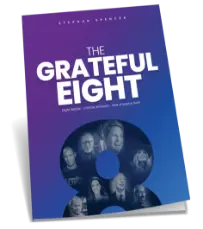Stephan Spencer on Studio D: "3 Big Lies about Foster Kids"
Welcome back. I’m Warren Wright. I’m joined now by Stephan Spencer. He’s a writer, speaker, and podcaster. And he’s here to talk about the three big lies about foster kids. And you actually were a foster kid yourself.
Yeah, Steve Jobs and Eddie Murphy were both foster kids. I grew up with a mom who was mentally ill, and so I ended up bouncing around a lot. And I lived with my grandparents until my grandma died, and then I went to live with my aunt in Connecticut. A year later, we moved to Florida. A year after that, she gets a divorce. I end up back in Toledo. I’m alternating between my grandpa, who is physically abusive, and my mom, who’s mentally ill until my grandpa gets sick and calls Children’s Services.
I end up being a foster child. And I’ll tell you, it feels terrible. I feel so alone. Like, not the kind of alone where I’m 13, living with my mom, and she’s working the third shift, so I end up being home alone every night. That’s scary, but this is a different kind of alone, where I feel like nobody in my family loves me, and yet, it’s this huge blessing because I have this wonderful foster mom who teaches me how to cook and how to sew buttons on.
Really?
And in that stability, I’m able to focus on my studies, maintain a four-point GPA, get a 32 on my ACT, and become absolutely perfect. I’m excellent at computers, and that ultimately led me to my business today, where I’m optimizing the websites of some of the largest brands in the world. None of that would’ve been possible if it weren’t for the stability of the foster care system, so that’s why I’m happy to be here today.
So, you wanna let people know more about the foster care system?
Yes, and I bought about foster kids and that there are three big lies about foster kids. So the first big lie is that foster kids are badly behaved. And this is not true. More than half of Americans wrongly believe that these kids are juvenile delinquents.
And yet, they’re the victims. They’re not the perpetrators. Kids who are in the foster care system are there because they’ve been abused, neglected, or abandoned at the hands of their biological family.
And far from being troublemakers, they’re so afraid of getting shuttled around that they actually really docile. I mean, they’re trying to fit in.
They’re good kids who are basically lost, and the system is not being there for them as much as we would like. So lie number two is that foster kids are, they have special needs, behavioral or medical special needs that make them difficult to parent. Again, not true. Only about a third of kids in the foster care system have any diagnosable disability. And then the third big lie.
But that scares a lot of parents, potential parents away, right?
Right. But the majority have no disabilities at all. And so then the third big lie is that these kids are underachievers. And again, not true. 65% of former foster children have had seven or more school changes between kindergarten and 12th grade. I was in that boat. It’s tough. Can you imagine having that kind of instability, trying to maintain a high GPA while you’re going through all these school changes? It is tough.
Right. So, I mean, like, how did you navigate that when you’d be forced to go to different schools and just keep up with your studies?
Once, I had a wonderful foster mom who provided me with that love and stability. I had the stability, and I was in one school. I had kind of the support system and a lifetime of love. In fact, she’s still a huge part of my life today. I see her at least once a year. I always send her flowers on her birthday and on Mother’s Day.
Ah, okay. So what are the things that you, do you have a formula for making sure that this, that a good foster care experience will be available for other kids?
Yeah, I have a formula for everybody to make a difference. Okay. So I want everyone to just care, see charity, give generously to organizations like CASA, Pajama Program, Together We Rise and the Dave Thomas Foundation for Adoption and help save a child. Attend training like Partnerships in Parenting where you can.
Learn the special tools required to foster and understand their world. Our requirements for licensing these are really simple, just like being a legal U.S. resident, being at least 21 years old, being able to pass a background check, and then finally E evaluation by a licensing agency, just to make sure that you’re fit to serve as a foster parent and that you have a home that’s safe for these kids.
So, what’s the one thing that you would like to tell potential foster parents out there it’s like, “Hey, listen up. This can you can, you can change someone else’s life in a really big way.” How would you try to convince them right now?
I would just want them to take a step in that direction. They don’t have to commit to being a foster parent. They just need to like, volunteer, donate, or do something that helps the lives of these children.
Just a little bit and see how it goes for you. And see if it works from there.
Exactly. Thank you. And visit my website, stephanspencer.com/foster, where they can get links to other resources.
And various websites where they can learn about this. Alright, Mr. Spencer, thank you so much for sharing this, and congratulations on overcoming so much. Really appreciate it. Alright, well sometimes a rainstorm can reveal a lot about the people who survived them. Check out these pictures. We want to take a look, and uh, you guys are going to, what’s going on here?


